Docent Group and their various users and writers (who we have exposed in various posts here). Thankfully, one of their previous ghost-writers and plagiarism-facilitators, Jared Wilson, already revealed that most of his clients demanded exegesis (the work of sermon preparation) and not mere illustrations or thought-concepts regarding the Text.
Exegesis is the work of sermon-writing, pulling the meaning out of the Text. It amounts to what Paul demands of pastors…
Study to shew thyself approved unto God, a workman that needeth not to be ashamed, rightly dividing the word of truth (2 Timothy 2:15)
The only thing left for a pastor to do after the exegesis is the sermon delivery, known as homiletics. That is, unless the sermon has been completely crafted by someone else, at which point what the pastor does is called “acting.” It shouldn’t suprise us that the SBC President, Ed Litton, who started us down the Docent Group rabbit hole has an IMBD page for acting. Sadly, it doesn’t include 15 years of preaching other people’s sermons in his acting profile.
But as we’ve demonstrated in our previous posts, and will demonstrate with an original Docent Group pdf prepared for a sermon series, they will do everything but literally preach it for you.
The PDF, entitled Ephesians Research, is a 280+ page document for the start-to-finish of an Ephesians sermon series.
Note the Table of Contents (below).
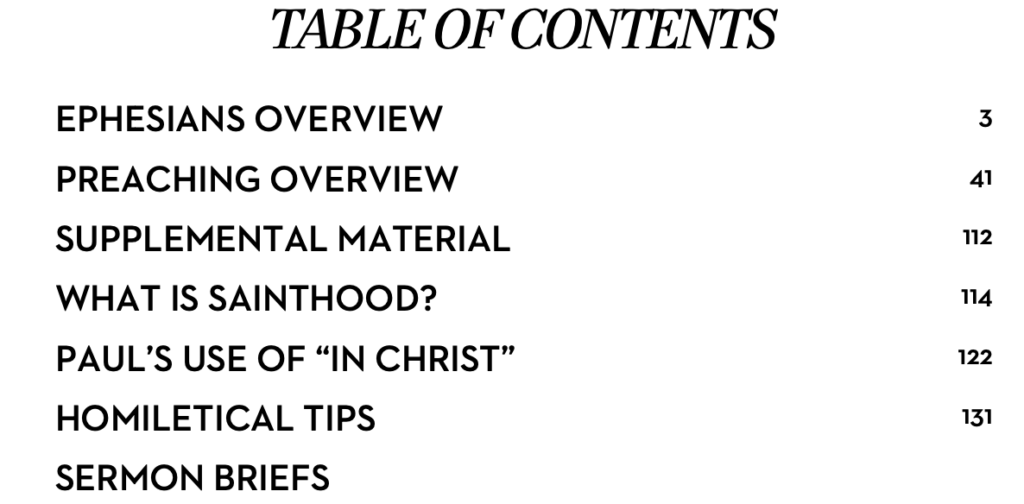
Notice that less than half to PDF includes overviews, supplemental materials (which is what Docent Group tells the public they do, accounting for only 2 pages of the PDF), definitions, some linguistic work, and “tips” for preaching. The rest of the 280 pages include “Sermon Briefs.”
What are the “Sermon Briefs?” See below.
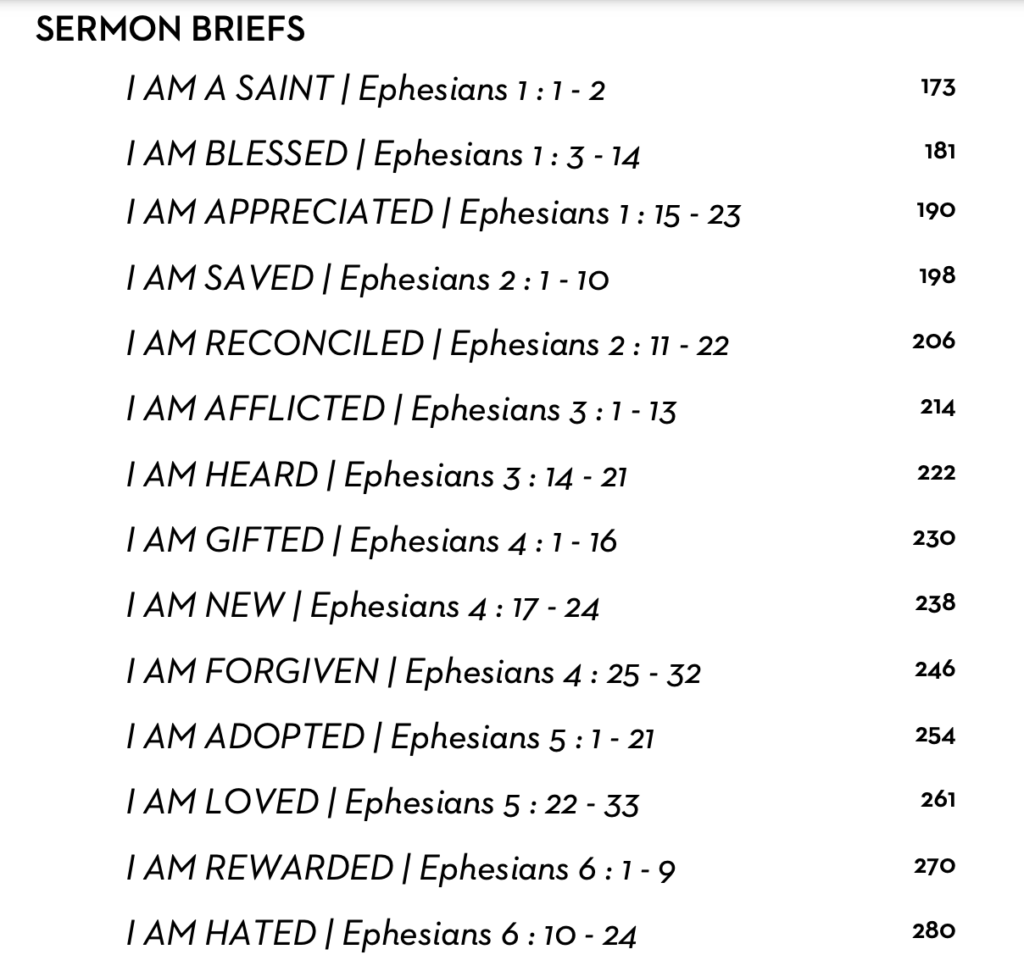
The so-called “Sermon Briefs” are approximately 8-10 pages long, which is about the length of a typical 35-40 minute sermon, written out in manuscript form. And when looking at their “Sermon Briefs,” we see that they are, effectively, sermons. There is nothing “brief” about 8-10 pages of sermon notes. This is a pre-packaged sermon, in which someone can merely add transitions from one point to the next, and to preach without any work of his own.
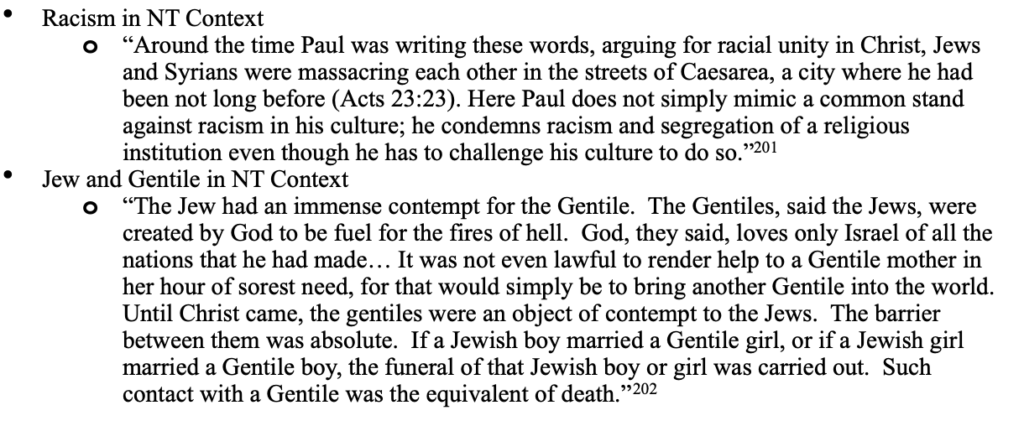
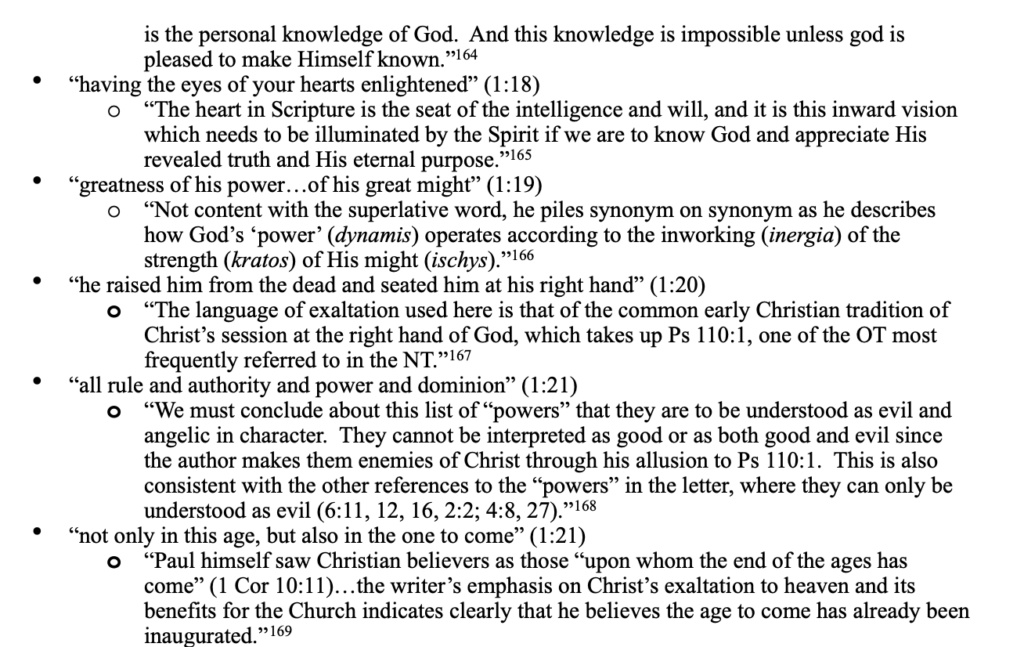
One might argue that some commentaries provide this type of service. The difference is, pastors do not quote Docent Group as doing their research and sermon prep. They are not attributing their research to paid “researchers” and exegesis providers. They are taking credit for “research” (exegesis) they did not do.
For this type of work, Docent Group charges $840 per sermon (at 100 “bank of hours,” give or take based upon how often they use Docent) per sermon. The math is (as Docent says in the small print below) that a standard sermon takes up to 12 hours, and billed at $70 per hour (for low-hour consumers). This sermon series cost at least $11,160 just counting the second half of the PDF.

That’s a lot of money to get out of doing your own sermon prep…which, pastors, Paul says is your job. But, this is why it appears that Docent Group has been used almost exclusively by mega-church pastors, whose churches can afford it. It’s the perfect vehicle to invade America’s pulpit with the gaggle of Marxists, pro-choice feminists, and Critical Race Theorists we have already exposed as their authors.









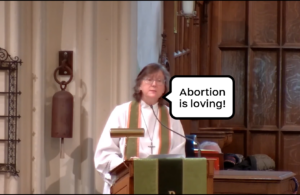













6 responses to “Docent Group PDF Shows Their “Research” and What They Charge to Prepare Megachurch $ermons”
I note the entire sermon series is about me….I am a saint, I am blessed, I am appreciated, new, forgiven, adopted, and loved. Nothing about God. “I am sinful” does not appear. Maybe it’s a glossed over intro to “I am forgiven.”
I’m skeptical that there are changes from one denomination to another. My Baptist friends don’t believe me when I tell them I can hear same message at their church as the Episcopalian church. They think I might be telling some sort of joke. I had not heard of Docent. But if you’re one of those people who has sat through a few different denominations in the past few years, you’ve already figured out that they all must have a common source for teachings; Docent is probably only one such provider. I read nothing above that the Episcopalian priestess wouldn’t have said from the pulpit. As long as there is no discernible doctrine of sin, everything else is about the same bland stuff about how much we’re loved. The Piskies may have a bit more sometimes about doing charitable works. Ecumenism has already been practically achieved. Evangelicals just don’t know it yet.
This gives a whole new meaning to ’emergent church’.
That is insane and the price is overboard, IMO. I’ll just read Protestia and watch the Fighting for the Faith youtube channels and come up (copy) with better sermons. lol
“argued for …”
“language used is … common … tradition”
Very subtle.
It’s almost like they have a problem with the fact that the Bible is God’s Word. God doesn’t have to “argue for” anything. He’s not “arguing for” racial unity. He’s saying there IS racial unity in Jesus. It’s not a goal to be pursued. It’s a done deal – all we must do is accept it. It’s not our “struggle” to pursue. It’s Jesus’ complete work already done. This is a very significant distinction.
The implication of the second example is that Paul’s writing emanated from tradition, long after the fact. Never mind that Paul led the early church, and was a contemporary of the Disciples. Beyond that, their exegesis is about as lazy as the “Pastors” using their material. This was not mere “tradition.” JESUS SAID IT (Luke 22:69)
And these are just two quick examples.
“For ye ARE all the children of God by faith in Christ Jesus. For as many of you as HAVE BEEN baptized into Christ have PUT ON CHRIST. There IS neither Jew nor Greek, there IS neither bond nor free, there IS neither male nor female: for ye ARE all one in Christ Jesus. And if ye BE Christ’s, then ARE ye Abraham’s seed, and heirs according to the promise.” – Galatians 3:26-29 [capitalization emphasis added]
All present and past tense. There is no “might be” “could be” “maybe” “will be” – “if we work hard enough” – no, Jesus’ work IS complete – 100% fully complete. Where we go wrong is our failure to accept this fact. To truly believe, with simple faith of a child. We don’t go wrong by not working hard enough, or not struggling hard enough (which is another way in which CRT is very antithetical to scripture). The secular, satanic approach is a perpetual “struggle” producing perpetual conflict, toward a hopelessly unreachable goal, as mankind’s futile effort to create perfect heaven on Earth, as a result of his own efforts.
When we simply accept, we see others, regardless of nation, tribe, tongue (which are Biblical terms – not the darwinist word “race”) we simply see persons who God created, who God loves, who Jesus died for.
But this is not to say we can support, embrace, affirm, condone, or participate in sin. When it comes to abominable sin (which is being mixed into it, by the secular world), we are told “from such turn away” – that doesn’t mean God didn’t create them, or that God doesn’t love them, or that Jesus didn’t die for them. It means God has defined limits. And beyond those limits, there can be no unity. We can’t unify in such circumstances any more than we could drive the getaway car for a bank robber.
Sin is not a unifier, it’s a separator. It separates us from God. It separates us from one another. There is no unity in or around sin. We’d be wise to simply accept the fact that infinitely perfect, infinitely knowledgeable, infinitely powerful God Almighty knows quite a bit more about it than us infinitely stupid human beings. If there’s any intelligence we can muster, we should at least muster enough to recognize that simple fact.
We have many these days pretending to be humble, pretending to be compassionate and caring – all while arrogantly thumbing their nose at God Almighty – which is the ultimate arrogance. And demanding that others do the same, is ultimate stupidity.